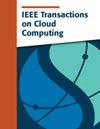MARS:基于 DRL 的无人机多任务资源调度框架与 IRS 辅助移动边缘计算系统
IF 5.3
2区 计算机科学
Q1 COMPUTER SCIENCE, INFORMATION SYSTEMS
引用次数: 0
摘要
本文研究了一个由无人机(UAV)和智能反射表面(IRS)辅助的动态移动边缘计算(MEC)系统。我们提出了一种可扩展的资源调度算法,以尽量减少无人机数量可变的 MEC 系统中所有 UE 和 UAV 的能耗。我们提出了一种基于深度强化学习(DRL)的多任务资源调度(MARS)框架来解决这个问题。首先,我们提出了一种新颖的 "优势行动者-批判者"(Advantage Actor-Critic,A2C)结构,其中包含状态值批判者和熵增强行动者,以减少差异并增强 DRL 的策略搜索。然后,我们提出了一个包含三个不同头部的多头代理,其中分类头部用于做出卸载决策,回归头部用于分配计算资源,而批判头部则用于估计所选行动的状态值。接下来,我们引入了多任务控制器,通过加载或卸载代理中的部分权重来调整代理,以适应无人机数量的变化。最后,我们引入了光狼搜索(LWS)作为行动细化,以加强对动态行动空间的探索。数值结果证明了 MARS 框架的可行性和效率。本文章由计算机程序翻译,如有差异,请以英文原文为准。
MARS: A DRL-Based Multi-Task Resource Scheduling Framework for UAV With IRS-Assisted Mobile Edge Computing System
This article studies a dynamic Mobile Edge Computing (MEC) system assisted by Unmanned Aerial Vehicles (UAVs) and Intelligent Reflective Surfaces (IRSs). We propose a scaleable resource scheduling algorithm to minimize the energy consumption of all UEs and UAVs in the MEC system with a variable number of UAVs. We propose a Multi-tAsk Resource Scheduling (MARS) framework based on Deep Reinforcement Learning (DRL) to solve the problem. First, we present a novel Advantage Actor-Critic (A2C) structure with the state-value critic and entropy-enhanced actor to reduce variance and enhance the policy search of DRL. Then, we present a multi-head agent with three different heads in which a classification head is applied to make offloading decisions and a regression head is presented to allocate computational resources, and a critic head is introduced to estimate the state value of the selected action. Next, we introduce a multi-task controller to adjust the agent to adapt to the varying number of UAVs by loading or unloading a part of weights in the agent. Finally, a Light Wolf Search (LWS) is introduced as the action refinement to enhance the exploration in the dynamic action space. The numerical results demonstrate the feasibility and efficiency of the MARS framework.
求助全文
通过发布文献求助,成功后即可免费获取论文全文。
去求助
来源期刊

IEEE Transactions on Cloud Computing
Computer Science-Software
CiteScore
9.40
自引率
6.20%
发文量
167
期刊介绍:
The IEEE Transactions on Cloud Computing (TCC) is dedicated to the multidisciplinary field of cloud computing. It is committed to the publication of articles that present innovative research ideas, application results, and case studies in cloud computing, focusing on key technical issues related to theory, algorithms, systems, applications, and performance.
 求助内容:
求助内容: 应助结果提醒方式:
应助结果提醒方式:


